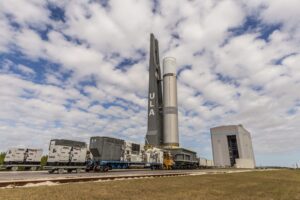MEI in 2018 won an estimated $55 million contract for engineering services related to the certification of two newly developed launch vehicles — ULA’s Vulcan and Northrop Grumman’s OmegA. The latter was terminated last year after failing to win a National Security Space Launch procurement contract.
The $13.2 million award is for “continued systems engineering and integration services for Vulcan launch system certification,” Col. Robert Bongiovi, director of the Space and Missile Systems Center Launch Enterprise, said in a statement.
MEI, Aerospace Corp. and SAIC are the primary contractors that work for SMC’s Launch Enterprise on new launch service provider entrant certification.
The latest task order awarded to MEI would support certification of Vulcan including the new BE4 engine provided by Blue Origin.
ULA announced this week that it has begun testing Vulcan’s core stage at the launch site at Cape Canaveral, Florida. The pathfinder tanking test booster was fitted with a pair of developmental BE4 engines as ULA awaits delivery of two flight configuration engines.
ULA faces a 2022 deadline to launch the first national security mission under the National Security Space Launch Phase 2 contract it won last year along with SpaceX.
ULA on Aug. 7 received a $337 million contract for two Phase 2 missions planned for fiscal year 2022.
ULA’s chief executive Tory Bruno told reporters in December he expects Vulcan will be ready for its maiden flight in late 2021. In addition to the engineering reviews, Vulcan has to complete two successful flights to get certified for national security launches. The first planned launch is a lunar lander for Astrobotic, a NASA contractor that will deliver payloads to the moon. The second flight is a Sierra Nevada Dream Chaser cargo mission to the International Space Station.
Typically three flights are required for national security certification but Bruno said Vulcan will be approved after two flights because ULA agreed to give the Air Force full access to its vehicle development data.



